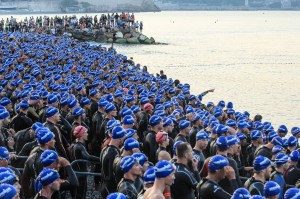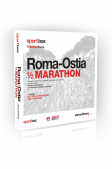The Ironman: just the name is the very substance of myths.
It is undoubtedly the most famous, the most evocative, the longest of the triathlon races, the race with the richest history. Lets do the maths: 2.4 mile (3,8 km) swim, 112 mile (180 km) cycle and a 26.2 mile (42.2km) run to finish. All in one day, one straight after the other.
A quick bit of history, these distances sprang from the idea of bringing together three epic races in 1977: the Waikiki Roughwater Swim (http://www.waikikiroughwaterswim.com ) ,the Hawaii Oahu 112m Island Bike Ride and the 26.2 mile Honolulu Marathon. (http://www.honolulumarathon.org).
And it is just like all “promised lands”, you yearn for the finish line right from the first steps that you take into the “fabulous world of the triathlon”. The “finisher” medal is a judgement of value, one of those virtual demarcation lines that legitimise your being, in some way, in the grown up world. It’s a bit like the first tattoo you get as a youngster, or the condom in the wallet of a 15 year old, you’re not yet ready, but you have it and that is enough for now.
The process is very much like that of the marathon-myth for a runner. You want to take on the challenge at all costs. You’re just at the start of your journey, but already longing to bite off more than you can chew.
The real problem is that we often think we’re able to take on such a long and challenging race without even having an idea of what it really entails. If we are talking physical fitness, an Ironman without adequate preparation is like putting a heavy weight onto the shoulders of a child. Taking on such a major race without suitable training can be very dangerous, and certainly very tough on the tendons, muscles and joints.
In these races the concept that “the medal doesn’t make the champion” is both true and pertinent. Finishing an Ironman in 16 hours or more (and many people do!) means having swum at a pace equal to that of a gentle dip in the sea in summer, having cycled as though it was a trip along the river with the family and having walked all 42km (26 miles) of the marathon. This is being an Ironman Finisher? This is the value of the field? This is some sort of victory? Is is really what we’re looking for?
It’s not however an ethical question. Everyone needs to take a very good look at themselves before trying to impose their personal opinion on others.
We are all free to choose how we want to hurt ourselves. But that, however, is exactly the point!
Finishing an Ironman without adequate training means exposing yourself to an highly elevated risk of injury and causing your body uncalled-for physiological stress. This above all when crossing the finish line – even on your knees – becomes an essential moral imperative, a demonstration that deep down “we are born to suffer” and we know how to do it without crying even a single tear.
It is precisely on this “moral imperative” that hangs the whole issue. The majority of the 13 hour plus Ironman Finishers, is made up of second generation sportsmen and women, that is those who discovered the fascination of endurance sport after the age of thirty and have since fallen in love with it. It is very unlikely that people with this profile are aiming to make it into the world’s top ten in the triathlon long distance category. Instead, the horizon that they should or could be aiming for, is that of doing sport as a way of staying physically fit and healthy and of having fun. That the Ironman, for someone who isn’t prepared for it, is a day made up predominantly of suffering is something that we can all agree upon. It is clear that an objective of this type represents neither wellness, or health, let alone fun. So why do we feel the need to take on this challenge? What type of validation is it that we are looking for in this rather distant finish line?
Perhaps it would be worth asking ourselves a few extra questions before investing more than 400 euros on the next race registration and forcing our body to comply with our rather over ambitious expectations.
Yes, perhaps it would be worth asking all of these questions, yet again, perhaps not. As with many other situations in life, the right measure is in the middle. What can you say, the search for challenges and thrills is becoming more legitimate than ever.
Challenge and excitement make up part of the fundamental meanings of life.
But therefore why not do it consciously, respecting and honouring our body, thankful for the way it supports us and puts up with us and all the bizzare ideas that spring into our heads every day? If challenge is what we want, let’s give it the respect is deserves by taking it on seriously.
Even with the appropriate preparation and training, you’ll suffer in an Ironman, you can’t escape it; but at least your body will be a little less at the mercy of the storm…but what are saying? At the end of such a long race, the body will finish in the storm anyhow. Ok, there aren’t logical, rational arguments; it’s just the same old story of being less at odds with our conscience.
Giving voice to all of these conflicts of the soul and the strong emotions that follow them, is Luca Borreca, who writes about his experience in the Wales Ironman.
“I want to hear that phrase, I slow down a little, the speaker is distracted, I want to call him but finally he notices me, takes a quick look at my race number and says the 5 words that I have most desired this last year; “LUCA, YOU ARE AN IRONMAN!”




 Subscribe to our newsletter to have the latest updates delivered straight to your inbox.
Subscribe to our newsletter to have the latest updates delivered straight to your inbox. TRI60 DISTANCE TRAINING
TRI60 DISTANCE TRAINING  Sportbox Training Focus Roma-Ostia Half Marathon 2019
Sportbox Training Focus Roma-Ostia Half Marathon 2019  Sportbox Training Focus Venice Marathon 2019
Sportbox Training Focus Venice Marathon 2019  t-shirt limited edition autographed by Danilo Goffi
t-shirt limited edition autographed by Danilo Goffi  Women's Sitting technical t-shirt
Women's Sitting technical t-shirt  Women's dove voglio technical t-shirt
Women's dove voglio technical t-shirt 